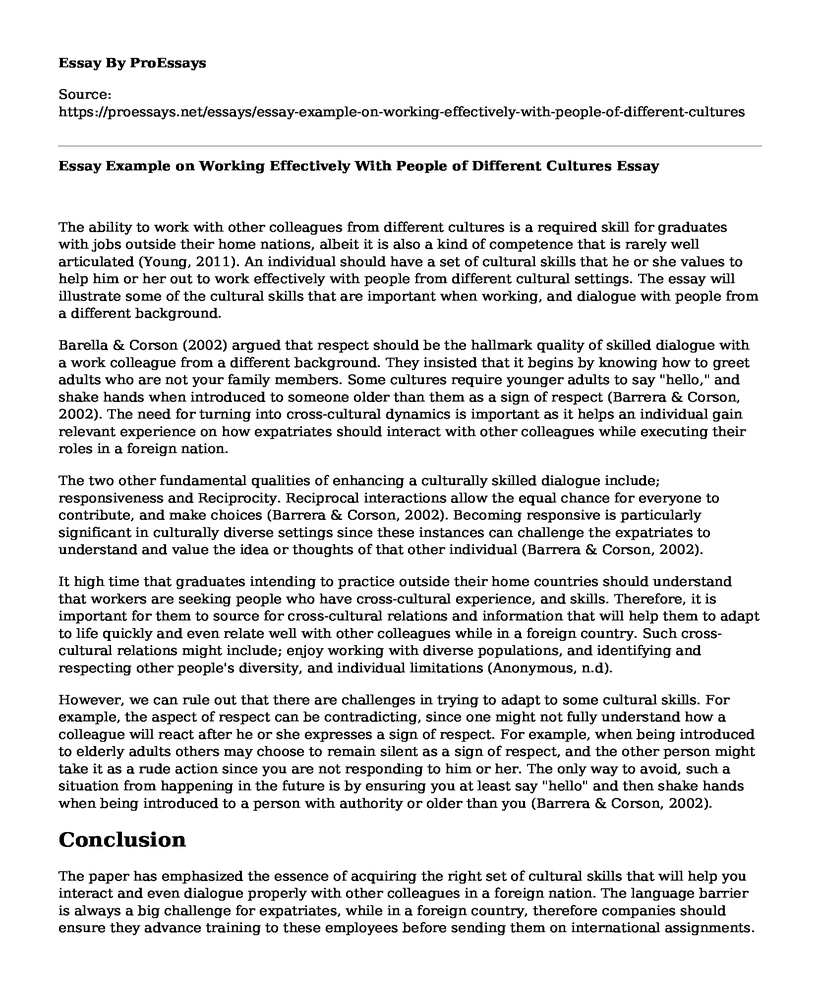The ability to work with other colleagues from different cultures is a required skill for graduates with jobs outside their home nations, albeit it is also a kind of competence that is rarely well articulated (Young, 2011). An individual should have a set of cultural skills that he or she values to help him or her out to work effectively with people from different cultural settings. The essay will illustrate some of the cultural skills that are important when working, and dialogue with people from a different background.
Barella & Corson (2002) argued that respect should be the hallmark quality of skilled dialogue with a work colleague from a different background. They insisted that it begins by knowing how to greet adults who are not your family members. Some cultures require younger adults to say "hello," and shake hands when introduced to someone older than them as a sign of respect (Barrera & Corson, 2002). The need for turning into cross-cultural dynamics is important as it helps an individual gain relevant experience on how expatriates should interact with other colleagues while executing their roles in a foreign nation.
The two other fundamental qualities of enhancing a culturally skilled dialogue include; responsiveness and Reciprocity. Reciprocal interactions allow the equal chance for everyone to contribute, and make choices (Barrera & Corson, 2002). Becoming responsive is particularly significant in culturally diverse settings since these instances can challenge the expatriates to understand and value the idea or thoughts of that other individual (Barrera & Corson, 2002).
It high time that graduates intending to practice outside their home countries should understand that workers are seeking people who have cross-cultural experience, and skills. Therefore, it is important for them to source for cross-cultural relations and information that will help them to adapt to life quickly and even relate well with other colleagues while in a foreign country. Such cross-cultural relations might include; enjoy working with diverse populations, and identifying and respecting other people's diversity, and individual limitations (Anonymous, n.d).
However, we can rule out that there are challenges in trying to adapt to some cultural skills. For example, the aspect of respect can be contradicting, since one might not fully understand how a colleague will react after he or she expresses a sign of respect. For example, when being introduced to elderly adults others may choose to remain silent as a sign of respect, and the other person might take it as a rude action since you are not responding to him or her. The only way to avoid, such a situation from happening in the future is by ensuring you at least say "hello" and then shake hands when being introduced to a person with authority or older than you (Barrera & Corson, 2002).
Conclusion
The paper has emphasized the essence of acquiring the right set of cultural skills that will help you interact and even dialogue properly with other colleagues in a foreign nation. The language barrier is always a big challenge for expatriates, while in a foreign country, therefore companies should ensure they advance training to these employees before sending them on international assignments. In a nutshell, successful expatriates often accept their new host culture and become less impacted by cultural differences (Young, 2011).
References
Anonymous. An inventory of cross-cultural skills: adapted from the big guide to living and working overseas. Retrieved from: file:///C:/Users/User/Downloads/AN%20INVENTORY%20OF%20CROSSCulturalSkills.pdf
Barrera, I., & Corso, R. M. (2002). Cultural competency as skilled dialogue. Topics in Early Childhood Special Education, 22(2), 103-113. Retrieved from: file:///C:/Users/User/Downloads/Cultural%20Competency%20as%20Skilled%20Dialogue.pdf
Young, R. (2011). Cross-cultural skills: essential for expatriate success. Retrieved from: https://www.chronicle.com/article/Cross-Cultural-Skills-/128782
Cite this page
Essay Example on Working Effectively With People of Different Cultures. (2023, Apr 07). Retrieved from https://proessays.net/essays/essay-example-on-working-effectively-with-people-of-different-cultures
If you are the original author of this essay and no longer wish to have it published on the ProEssays website, please click below to request its removal:
- Essay on Personal Career Strategy and Objectives
- The Job of Bookkeeping Requirements Paper Example
- Financial Analyst Application Paper Example
- Lawyer Job Reflection Essay Sample
- Making Criminology Career Essay
- Essay Example on Mediation: Disclosing Conflict of Interests for Fair Resolution
- Essay Example on Corporate Social Responsibility (CSR): Reducing Carbon Footprints, Improving Labor Policies & More







